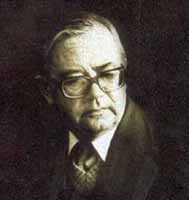  Born in a village near Prilep in 1921. Studied philology at Skopje University and worked there as a professor. Was the first chairman of the Macedonian Academy of Sciences and Arts, corresponding member of the Yugoslav Academy of Sciences and Arts, as well as of the Serbian and Slovene Academies, and honorary doctor of the Universities of Chicago and Krakow. Wrote poetry, short stories, and essays, as well as scholarly works, many of them on the Macedonian language. Editor of the Dictionarv of the Macedonian Language, translator of Heine and Shakespeare. His works have been translated into Serbian, Croatian, Slovene, Albanian, Turkish, Hungarian, French, Russian, Italian, Greek, Polish, Romanian, German, and English. Winner of numerous prizes, including the Golden Wreath of the Struga Poetry Evenings. Born in a village near Prilep in 1921. Studied philology at Skopje University and worked there as a professor. Was the first chairman of the Macedonian Academy of Sciences and Arts, corresponding member of the Yugoslav Academy of Sciences and Arts, as well as of the Serbian and Slovene Academies, and honorary doctor of the Universities of Chicago and Krakow. Wrote poetry, short stories, and essays, as well as scholarly works, many of them on the Macedonian language. Editor of the Dictionarv of the Macedonian Language, translator of Heine and Shakespeare. His works have been translated into Serbian, Croatian, Slovene, Albanian, Turkish, Hungarian, French, Russian, Italian, Greek, Polish, Romanian, German, and English. Winner of numerous prizes, including the Golden Wreath of the Struga Poetry Evenings.
Epistle
Without you, Tyre and Sidon,
life has existed here for thousands of years and will continue.
We humans are like grass:
crushed, dried, withering, dying.
The land alone remains.
We humans are like ants:
squashed, destroyed, and again gathering in a pile.
From here, sometime, began the march to the Indus, who could have foreseen that?
Along the Via Egnatia Cicero went into exile
in Salonika.
Near Drama
Caesar's ghost appeared to Brutus
in the tent
on the eve of the decisive battle.
And fifteen martyrs were consecrated at Tiveriopol. Naum built a monastery
at the source of the White Like.
This land also gave strength to King Marko. And yet,
has it not suffered humiliation?
Everything is ordained -
we depart
but the land remains.
Small things
All these trinkets,
toys,
trifles, souvenirs,
small mementoes or great moments, small presents from great friends,
one day
they'll lose their magic attraction, their small warm souls,
to turn into cold bits and pieces. Maybe the elm which has begun to die
now similarly feels that it bears
a lot of withered branches.
Skopje
You who will stand on Gazibaba, you, my descendant hear me:
From here I too have gazed on Skopje,
it was a spring day, one of those
when the fresh outlines of the roofs
are softly interwoven
and every poplar is a green waterjet.
My gaze a little veiled
(that's why I'm silent)
but clear-sighted and bright.
Know you:
I feel that this my call
is the boldest grasp for the future,
an embrace of your soul, I'd say,
and cutting like a fresh-honed edge, dreaming, teeming, screaming:
remember me!
The call
This voice of the muezzin
from a tape,
this velvet baritone
from the mosque,
this morning it sounds so persuasive,
like a link between earth and heaven,
so consoling and so calming,
and so deep at first sight,
that intimate contact!
And yet, if you understand the prayer's words
you'd realise that this is just a call,
effective only for the faithful
on this poor earth of ours.
Recollection after many years
I was perhaps not quite twenty when I wrote:
"So much did woe cry out within me that I was born into a tribe in need." And to this day
the injury will bleed:
I'm haunted by that ever-present woe and one that's greater still,
so that, sower of barren seed,
I'll say,
to change the words a little,
"Still does the woe cry out within me that I am horn into a tribe in need."
And yet I hope this isn't so,
since I have undergone the test
of such great woe.
|